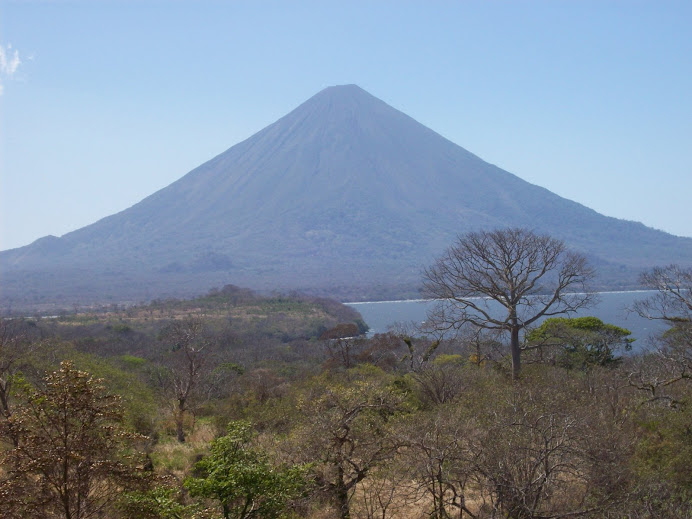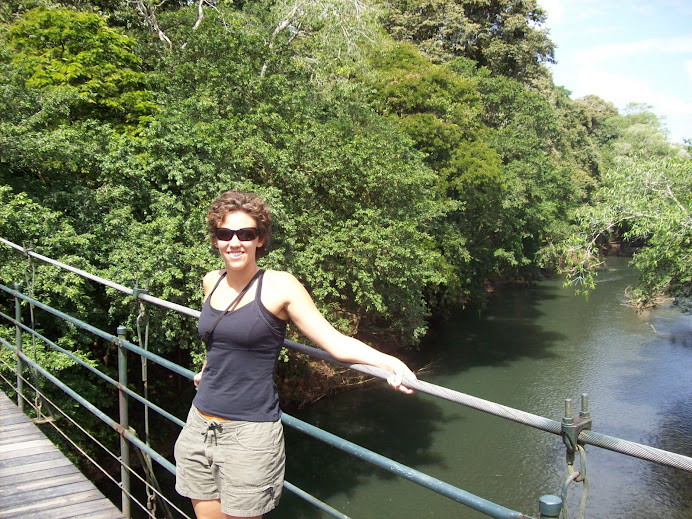
David and I returned to Bluefields on Friday in a dugout canoe with a 15 horsepower motor, which meant 6 hours of queasiness traveling up the coast from Monkey Point. It was definitely strange to arrive back in the city and find our senses overloaded by the amount of cars, people, garbage, noise, and stuff after 35 days in the bush plus 6 hours on the sea. And while there are some perks involved in being back at Bluefields (comfy bed, fans, cold beer, ice cream, delicious dinner and dessert parties with the other volunteers), I'm missing Monkey Point and am anxious to get back. However, we're making the most of this week by not only catching up on email and blogging, but also meeting with blueEnergy staff, figuring out what our strategy is for introducing batteries into the community for home electrification, meeting with the micro-credit organization who will be helping people to purchase the batteries, meeting with the Rama and Creole Territorial Government, working on reports, giving presentations, buying supplies for the next three weeks in Monkey Point, etc.
So what did we do in Monkey Point for 35 days? Sure, there was plenty of coconut eating and beach time as one might expect, but our first month in the community was actually quite busy with classes 7 days a week on literacy, English, the environment, and energy, plus our work with the Energy Commission in advancing with the energy project and ensuring that the energy system is benefiting the community in an equitable way. There have been frustrations, challenges, big laughs and huge rewards. I think that my happiest moments have been in the literacy classes, in which I have seen many students make huge leaps forward. The thirst that people (both children and adults) have for learning is amazing! Until the 80s (post-revolution) secondary education was illegal on the coast, and even today very few people have studied at all, many kids spend years in first grade (the education being so poor and the classes so few and far between that they never learn enough to pass), and it is rare that a teacher spends much time at all in isolated communities like Monkey Point. So having classes 7 days a week, rain or shine, is something new in Monkey Point and something people love! It's also an excellent way to be taking advantage of the power from the blueEnergy system- holding night classes everyday, in which at least a couple people from every single family are present. The benefits for the community are huge, and we're all enjoying ourselves. Of course it's frustrating to know that once we leave for good (August 7 or so), the community teacher will promise to take over our night literacy classes and continue teaching environmental education, but will probably not end up following through. He's overloaded, has health problems, and likely doesn't want to take on more work on a volunteer basis when he already makes a tiny salary. However, even if our classes aren't continued past August, I have seen enough progress in the first month that I feel confident in saying that we've made an impact. Lilian, a 28 year-old mother of 4 who never studied a day in her life until recently, has told me that she can feel her mind opening up more and more every day. When I arrive at her home in the mornings for private classes (in addition to the night classes that she attends), she is always out on her porch early with her books, studying on her own and eagerly awaiting our class. Every student in my class can now write his or her first name (up from less than half when we began classes) and many are writing their full names. Even if there are a couple who still don't know the vowels, I'm happy to know that when I leave, everyone in my class will be able to sign his or her own name.
The challenges of living in a poor rural community full of ethnic/racial tensions have of course been plentiful. The Father's Day party which David and I helped to decorate and prepare for with the children (this was one of my favorite afternoons!) ended up with two drunk men getting in a machete fight. While we have been safe and healthy, 3 of our chickens disappeared within the first two weeks, likely stolen. Luckily one hen who lays a blue egg every morning remains. Thank you to the thieves for leaving the only egg-layer of the 4 behind!
Perhaps the biggest frustration for us has been the difficulty of holding meetings with the Energy Commission. While they all arrived fairly punctually (within an hour of the starting time, which is normal) for our first weekly meeting, and expressed to us how eager they were to move ahead with the project and begin home electrification via batteries, only the two members of the Commission who currently have direct benefit from the system in the form of light in their homes have bothered to attend our other meetings. Of course I have begun to understand why for some, a sunny Saturday afternoon is better spent planting quiquisque than meeting with a couple of gringos who may or may not follow through with their promises to help provide energy to homes. We are lucky to have two committed members of the Commission at this point, and it seems likely that once there are other beneficiaries in the community (people who have light in their homes from the blueEnergy system), there will be more people truly interested in working with the Energy Commission.
There is so much more to say, so many stories to tell. It's been quite the adventure so far. In order to keep things short, I have decided to sum up a few other aspects of my time in Monkey Point in simple numbers:
Number of days in Monkey Point: 35
Average hours of classes given daily: 3
Number of pictures taken: 881
Number of times I have been spied on by a monkey while in the outhouse: about 30
Number of sea turtles seen bludgeoned to death: 1
Number of lunches in which sea turtle was served: 1
Time which must pass after the scheduled starting time for a class or meeting before people begin to arrive: 30-60 minutes
Number of days in a row without sun: 4
Number of mice who invade our house at night: sounds like at least 10
Feet scaled by yours truly on a coconut tree: just 5 or 6
Feet scaled by the average child on a coconut tree: 30-40
Average amount of hours spent in a hammock per day: 2
Average number of times that David and I go swimming in the ocean per day: 1.5
Number of households interested in purchasing batteries to electrify their homes: 20
Average number of Energy Commission members (out of 6) who attend our weekly meetings: 2
Number of times I was in contact with the world outside Monkey Point: 1 (via radio)
























2 comments:
Lynn, I have very much enjoyed your blog and pictures this summer and have been fascinated by the Atlantic side of Nicaragua. JoAnn
That's a great article, Lynn... However, how about sharing a little more of these 881 pictures ?
Cheers !
Post a Comment